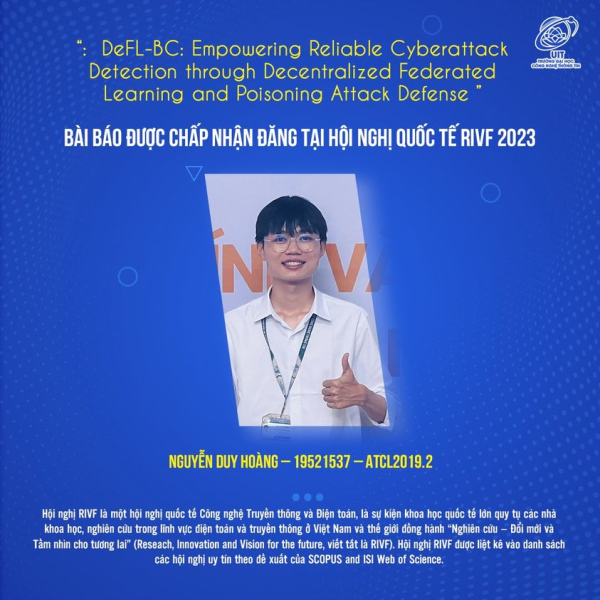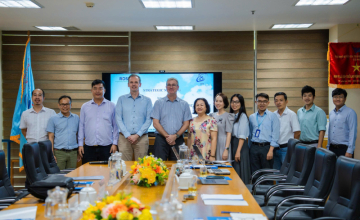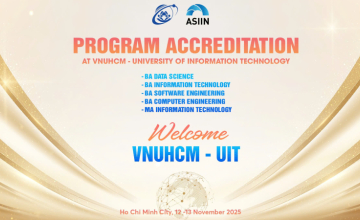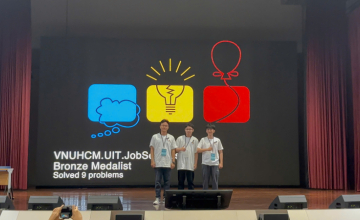Title: "DeFL-BC: Empowering Reliable Cyberattack Detection through Decentralized Federated Learning and Poisoning Attack Defense"
Link to the paper: https://drive.google.com/file/d/1OceAmIbHjbcO-5EwXCQqpY6tDGTdZ1eK/view?f...
Student: Nguyen Duy Hoang – 19521537 – ATCL2019.2
Supervisors:
M.S. Phan The Duy
M.S. Tran Tuan Dung
Abstract:
Federated Learning (FL) is a powerful method for training machine learning models without requiring the sharing of personal data. Each party trains a local version of the model on their own data. The training results from all parties are aggregated to create a global model. Federated Learning is particularly useful in situations with sensitive and hard-to-share data. However, federated learning faces challenges related to poisoning attacks, where a malicious party can manipulate or inject noise into the data during training, potentially harming the machine learning system. Therefore, integrating blockchain technology into federated learning becomes essential. Blockchain is a decentralized and tamper-proof system that reduces the risk of system failures and protects against malicious collaborators and poisoned data through consensus mechanisms.
This work presents a collaborative and trust assurance model for network attack detection using Federated Learning (FL) in edge computing environments. This study leverages the capabilities of Federated Learning (FL) and blockchain technologies, specifically the Hyperledger Fabric platform, to construct a decentralized Federated Learning model, named DeFL-BC framework that can encourage contribution from the community and resist to poisoning attacks. Our framework aims to detect and prevent network attacks effectively in the Industrial Internet of Things (IIoT) contexts with the knowledge sharing from collaborative participants without privacy leakage. The experiments conducted on two datasets, Edge-IIoTset and CIC- IDS2018 demonstrate that the proposed framework is robust inreducing a single point of failure of the system, and showing outstanding performance under poisoning attacks when the accuracy is up to more than 90% and addressing limited computing resources and intermittent network connectivity in cyberattack scenarios. Furthermore, the integration of blockchain technology enhances security and resilience, effectively mitigating the risks of the single point of failure in conventional FL approaches.
I would like to express my sincere gratitude to M.S. Phan The Duy and M.S. Tran Tuan Dung for their continuous support and motivation throughout the research, as well as their valuable input that helped improve the study.
The RIVF conference is an international event on Information Technology and Communication, a major international scientific event that brings together scientists and researchers in the fields of computer science and communication technology in Vietnam and worldwide under the theme "Research, Innovation, and Vision for the future," abbreviated as RIVF. The RIVF conference is listed in the prestigious conference list recommended by SCOPUS and ISI Web of Science. RIVF has been organized 16 times, and the 2023 edition marks its 16th occurrence.
The RIVF 2023 conference focuses on the following main topics: Image, language, and speech processing; Communication & Computer Networks, Network Security; Distributed systems, Internet of Things, Cloud computing; Artificial Intelligence, Data Science, Big Data Analysis, Intelligent Computing; Software engineering, Information Systems, Computational models.
RIVF conferences began in 2003 as a joint effort of professors Patrick Bellot, Marc Bui, Duong Nguyen Vu, and colleagues from various countries, including Professor Nguyen Dinh Tri and professors from the Institute of Francophonie for Informatics (IFI) in Hanoi. By 2007, RIVF had transformed from a French-speaking computer science conference organized in Vietnam into an international conference of the IEEE (Institute of Electrical and Electronics Engineers) covering both IT & Communication Technology, with significantly improved quality.

For more details, visit: https://www.facebook.com/UIT.Fanpage/posts/pfbid07TPxkX9E3...
Hai Bang - Media Collaborator, University of Information Technology
Nhat Hien - Translation Collaborator, University of Information Technology







